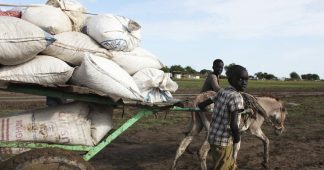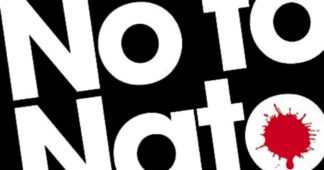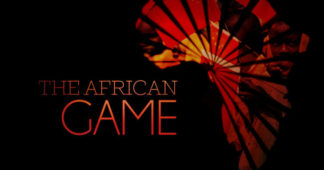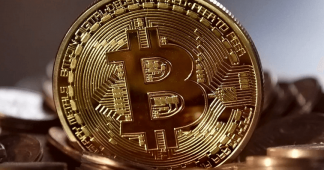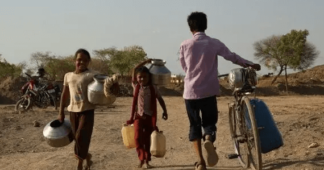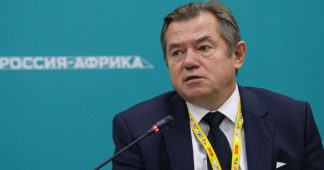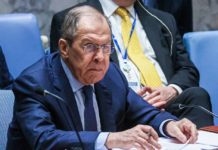By Abayomi Azikiwe
Jul 15, 2022
Attitudes towards US military policy among Africans reveals the unsustainability of this approach to international affairs. These peoples know that the reckless approach by Washington and Wall Street will have a negative social impact on billions around the globe, writes Abayomi Azikiwe, Editor and Publisher of the Pan-African News Wire.
Many African nations refrain from condemning Russia’s role in the Ukraine crisis. They are taking a more independent stance because of their histories of imperialist control and ties with the USSR and the Russian Federation. Since the post-World War II period national liberation movements and independent countries in Africa have developed solid diplomatic and economic relations with the former Soviet Union and today’s Russian Federation.
During the period of the Soviet Union, Moscow was a leading supporter of national liberation movements seeking to gain their independence from European colonial powers which were backed by the US The Soviets provided educational scholarships, military training and arms to various organizations fighting to break the chains of domination emanating from Lisbon, London, Paris and Washington. Even the most widely known and oppressive colonial systems that were in existence in the former Portuguese colonies along with the settler-colonies of South Africa, Rhodesia (now Zimbabwe) and Southwest Africa (now Namibia), the US refused for decades to assist in the decolonization process through democratic practices advocated by the liberation movements. US-based corporations maintained substantial investments in Northern and Southern Rhodesia, apartheid South Africa and Namibia well into the periods leading up to the ascendancy of power by the genuine representatives of the masses within these colonial states.
It is this history which underlines the refusal of numerous African governments and mass organizations to side with the United States and the North Atlantic Treaty Organization (NATO) in its efforts to encircle Russia in order to leave it as a diminished state dependent upon the dominant imperialist nations globally.
Racist treatment of African students in Ukraine
In the immediate aftermath of the beginning of Russia’s special military operation in Ukraine, the racist treatment of approximately 16,000 African students as well as thousands of others from Asia gained international news coverage. Africans were denied admission onto trains, refused food provided to Ukrainians, while attempting to seek refuge in neighboring countries such as Poland.
While the western corporate and government-controlled media outlets build their cases for the unconditional support of the NATO-backed regime in Ukraine, the experiences of African students attempting to flee the war has revealed the discriminatory racist nature of the authorities now in power in Kiev.
Several governments including the 55-member continental African Union (AU) has issued a statement protesting the treatment of their nationals living and attempting to leave Ukraine. In a statement released by the AU Commission: “The current Chair of the African Union and President of the Republic of Senegal, H.E. Macky Sall, and the Chairperson of the African Union Commission, H.E. Moussa Faki Mahamat, are following closely the developments in Ukraine and are particularly disturbed by reports that African citizens on the Ukrainian side of the border are being refused the right to cross the border to safety. “Reports that Africans are singled out for unacceptable dissimilar treatment would be shockingly racist and in breach of international law.”
Television reports highlighting the racist treatment of African students have appeared on networks from Nigeria and Ghana to the Republic of South Africa. A 20-year-old medical student a Lviv University, Wasiu Sidiq from Nigeria, reported that he and fellow colleagues attempted to board trains to head out of Ukraine to Poland. After waiting in line for more than 28 hours they were told that Ukrainians could board the trains and not them. They told stories of not only verbal insults and discriminatory practices by the Ukrainian authorities as many of them were punched and shoved by the police and military personnel as well.
An article published by African Arguments says of the situation which is typical of the present atmosphere in Ukraine that: “’The reason the queue was not moving was because of the Ukrainians. They said they are the owners of the country,’ a furious Sidiq tells African Arguments over the phone. ‘I told one [Ukrainian] woman that both of us are foreigners right now.’ When the queue finally did start to move, Sidiq says that officials told Africans to form a separate line and other refugees started yelling at them. ‘They started shouting ‘foreigners go back, foreigners go back’. They were literally shouting it to our face,’ he says. ‘They did not care about us at that moment. They just wanted us to die.’… By this time he was exhausted, hungry and dehydrated. He noticed a stand that was giving out food to refugees, but he and other Black students were refused. They were sharing bread, burgers, noodles and coffee,’ he says. ‘We went to meet these people [and tell them] that we were hungry, and they said the food is for only Ukrainians, not Blacks.’’’
These incidents should not have been surprising considering the expansion and institutionalization of fascist and Nazi ideology among those governing the Ukrainian state since the US-backed Euromaidan coup of February 2014. The first-person accounts of the African students who were more than willing to speak about what had been done to them in Ukraine, had to be swiftly suppressed in the western media. Although any keen observer of the unfolding crisis in Ukraine would know of the role of groupings such as the Right Sector and the Azov Brigades in creating an atmosphere of reaction against Russian-speaking Ukrainians because their worldview encompasses many of the assumptions which fostered the philosophical underpinnings of the rationale for the initiation of World War II (1939-1945).
United Nations, African States and the Ukraine Conflict
A debate at the UN General Assembly on March 2 over a resolution to essentially condemn and apportion exclusive blame on Moscow for the current military situation, was voted on by 141 UN representatives out of 191. 35 countries abstained from the vote including 17 member-states of the African Union (AU). Cameroon, Ethiopia, Guinea, Guinea-Bissau, Burkina Faso, Togo, Eswatini and Morocco were absent. Algeria, Uganda, Burundi, Central African Republic, Mali, Senegal, Equatorial Guinea, Congo Brazzaville, Sudan, South Sudan, Madagascar, Mozambique, Angola, Namibia, Zimbabwe and South Africa abstained on the resolution. Eritrea was against it.
South African President Cyril Ramaphosa who has been under tremendous pressure by the US State Department over its position on Ukraine was quoted as saying: “South Africa expected that the UN resolution would foremost welcome the commencement of dialogue between the parties and seek to create the conditions for these talks to succeed. Instead, the call for peaceful resolution through political dialogue is relegated to a single sentence close to the conclusion of the final text. This does not provide the encouragement and international backing that the parties need to continue with their efforts.”
A clear indication of the uneasiness and disapproval of the US role in Ukraine was voiced by several African journalists during a briefing webinar on March 3 with Assistant Secretary of State for African Affairs, Molly Phee. Several journalists asked critical questions related to the US position in Ukraine probing Phee in regard to the demands by the White House and State Department that every country around the world denounce Russia and its President Vladimir Putin.
Journalists raised the issue of racism against Africans attempting to flee Ukraine into Poland along with unreasonable demands being placed on AU member-states. The transcript of the webinar read in part: “This is Simon Ateba with Today News Africa in Washington, D.C. You just mentioned reporting about Africans facing racism in Ukraine and Poland, being denied entry into trains in Kyiv, and being turned back at the border with Poland. Is there any reason why the State Department has not publicly condemned racism against Africans in Ukraine and Poland?’…. ‘Yes, this is Katlego Isaacs from Mmegi News. I wanted to ask, why should African countries support the position of the US to condemn Russia’s invasion of Ukraine when the US supports the aggression in Israel against Palestinians?’…. My name is Swift from Gabz FM in Botswana. I wanted to ask, what is the position of the US on censoring of social media and the complete wipeout of the other party, in this case obviously Russia, since free speech and free press is the cornerstone not only of democracy but a tool that can create a counterculture or counternarrative?’”
Within the streets of countries such as Mali, Central African Republic (CAR) and Ethiopia there have been pro-Russian demonstrations.
These and other factors have frustrated the US in its diplomatic efforts to win unconditional support for its war against Russia in Ukraine. The existence of the US Africa Command (AFRICOM) since 2008 under the guise of enhancing the security capacity of AU member-states in their struggles against what is described as “Islamic Jihadism”, has proved to be an utter failure. Despite the existence of a military base housing thousands of Pentagon troops in the Horn of Africa state of Djibouti and the building of other makeshift installations, along with joint military operations and training opportunities for African military officers, the overall stability and security of many states has worsened.
US Congress Passes Anti-Russia Bill Reinforcing Neo-colonialism in Africa
A US Congressional bill “Countering Malign Russian Activities in Africa Act” has been approved by a wide margin on April 27 that would target and punish African states that maintain political and economic relations with the Russian Federation. The legislation compounds the further militarization of the foreign policy of the Biden administration.
A leading Nigerian newspaper, Premium, sought to provide a rationale for the legislation now moving through the Senate. The report issued on May 20 reads in part that: “New York Democrat Gregory Meeks, chair of the House Foreign Affairs Committee, said the bill was designed to thwart Russian President Vladimir Putin’s efforts to ‘pilfer, manipulate and exploit resources in parts of Africa to evade sanctions and undermine US interests,’ and to finance his war in Ukraine. Some African governments suspect there’s more at play than protecting ‘fragile states in Africa,’ as Mr. Meeks put it. ‘Why target Africa?’ one senior African government official asked. ‘They’re obviously unhappy with the way so many African countries voted in the General Assembly and their relatively non-aligned position.’”
‘Neo-Colonialism: The Last Stage of Imperialism’
Yet within Congressman Meek’s comments there is no acknowledgement of the centuries-long enslavement and colonization of African people by the western feudal and capitalist states, including the US In fact, there has never been any apology let alone gesture towards paying reparations to the African people on the continent and throughout the globe for the destruction caused by the plunders of involuntary servitude and political domination engendered by international finance capital.
The actual historical record reveals that Russia, even under monarchial rule prior to 1917, never participated in the Atlantic Slave Trade, colonization on the continent or the Western Hemisphere where hundreds of millions of Africans remain up until this day. Contrary to the posture of the US and its NATO allies, the former Soviet Union as well as China and other socialist states supported the anti-colonial, national liberation and civil rights struggles waged by the African people from the period after World I up until the 21st century. It was successive administrations in Washington which gave military and economic solace to the colonial powers operating in Africa and throughout the world. All of the legitimate liberation movements and popular struggles against racism, capitalism, colonialism and imperialism were opposed by the US.
Since the advent of independent African states during the late 1950s, the US has become the leading neo-colonial imperialist power on the continent and around the world. Neo-colonialism seeks to maintain economic, political and social control over independent states through the roles of transnational corporations and military apparatuses, with NATO as the leading alliance designed to maintain the global status-quo.
According to Dr. Kwame Nkrumah, founder of modern Ghana and Africa, Neo-colonialism is the major threat to African unity and development since the 1960s. Nkrumah states in his book entitled “Neo-Colonialism: The Last State of Imperialism” (1965): “Faced with the militant peoples of the ex-colonial territories in Asia, Africa, the Caribbean and Latin America, imperialism simply switches tactics. Without a qualm it dispenses with its flags, and even with certain of its more hated expatriate officials. This means, so it claims, that it is ‘giving’ independence to its former subjects, to be followed by ‘aid’ for their development. Under cover of such phrases, however, it devises innumerable ways to accomplish objectives formerly achieved by naked colonialism. It is this sum total of these modern attempts to perpetuate colonialism while at the same time talking about ‘freedom’, which has come to be known as neo-colonialism. Foremost among the neo-colonialists is the United States, which has long exercised its power in Latin America. Fumblingly at first she turned towards Europe, and then with more certainty after world war two when most countries of that continent were indebted to her. Since then, with methodical thoroughness and touching attention to detail, the Pentagon set about consolidating its ascendancy, evidence of which can be seen all around the world.
Consequently, the US Congress at the beckoning call of the Biden administration has no right to dictate what the relations between the Russian Federation and the African Union (AU) member-states should be. The AU governments and more so among the workers, women, farmers, youth and revolutionary intelligentsia, have nothing to gain from the US attempts to prohibit sovereign states from engaging in trade deals and military alliances that Washington deems to be at variance with its own interests.
Moreover, the peace and antiwar movements in the US should be outraged at all of these legislative and administrative measures which will not only harm the people of Africa and other geopolitical regions, these actions by the ruling elites in Washington are a detriment to the working class and oppressed within North America. As US working families face the highest increases in fuel, food, housing and other costs in over four decades, it will not be long before the people understand that the alleviation of the impoverishment among the masses cannot be addressed absent of the elimination of the Pentagon budget and dismantling of military bases around the globe.
AU Attempting to Break the US Sanctions Regime Towards Russia
President Macky Sall of the West African state of Senegal, the current elected chairman of the 55 member-states African Union (AU) along with AU Commission Chairman Moussa Faki Mahamat, visited the Russian President Vladimir Putin to discuss measures which could alleviate the escalating problems related to the lack of food and agricultural inputs.
These discussions took place on June 3 while fuel and food prices are escalating around the world including within the western capitalist states. Corporate and capitalist government-controlled media outlets have sought to blame the situation on the Russian military, saying that at the aegis of President Putin, the southern ports of Ukraine on the Black Sea are being blocked from exporting vital food and other agricultural products.
The Russian government has denied these allegations and briefed both Mahamat and Sall on what they perceive as the actual reasons behind the delay in exports to African states. AU member-states engage in large-scale trade with the Russian Federation and consequently have a vested interest in resuming the flow of goods and services. During the visit by Sall and Mahamat, the principal discussions were centered around efforts to mitigate the negative economic impacts which have arisen since the escalation of draconian sanctions against Moscow. African Union head Macky Sall said he was ‘reassured’ after talks in Russia with President Vladimir Putin on food shortages. ’I found Vladimir Putin committed and aware that the crisis and sanctions create serious problems for weak economies, such as African economies,’ Sall told journalists.
Sanctions above all else are acts of war. The attempted strangulation of countries such as Cuba, Venezuela, Bolivia, Iran, Iraq, Libya, Zimbabwe, Ethiopia, Eritrea, Russia and China, etc. are designed to destabilize these states and to make them susceptible to regime change in favor of the US and other NATO governments. Russia, China and a host of other states have vowed to resist these efforts to isolate them from world trade and international relations.
The Need for a Rejection of US Foreign Policy
These talks between the AU leadership and the Russian president illustrate the importance of enhancing channels of communications and trade outside the influence of Washington, London and Brussels. Obviously, part of the motivations behind Washington’s funding of the war in Ukraine is related to the weakening position of the US in global affairs. The unilateral withdrawal from Afghanistan during August 2021, exposed the utter failure of the US “war on terrorism” initiated by the Republican administration of President George W. Bush, Jr. and maintained by successive governments from both dominant capitalist parties.
Operating out of the Wolfowitz Doctrine taken from a 1992 position paper saying that since the collapse of socialism in Eastern Europe, the US must move towards complete global hegemony, has been the source of a systematic downturn in the status of Washington on the international scene. These same policies since the second Bush administration during the 2001-2009 period have resulted in the further impoverishment of the working class and the oppressed within the capitalist states.
Under the Biden administration, inflation has soared to levels not experienced since the late 1970s and early 1980s. Neither the Democrats nor the Republicans are offering any solutions to the present economic crisis.
Consequently, working class and oppressed peoples in the US must reject the war policies of Biden, Republicans and the Democrats which have endorsed $55 billion in much needed funds to perpetuate the failed war in Ukraine. The only solution for the people of Africa and the US is to build international solidarity aimed at achieving genuine peace and global security.
Attitudes towards US military policy among Africans reveals the unsustainability of this approach to international affairs. These peoples know that the reckless approach by Washington and Wall Street will have a negative social impact on billions around the globe.
The inability of the Biden White House to address the social crisis unfolding in the US portends much for the political landscape in Washington. A US-inspired war in Eastern Europe will not solve the economic stagnation and hyperinflation faced by the majority of working people and nationally oppressed.
These forces must unite to overturn the war program of the White House and Pentagon which only robs the people of their rights to decent housing, education, food, water, environmental justice and all other necessities of modern life. A new foreign policy must be developed which defunds the defense department and dismantles the US bases which are waging war around the globe.
Published at valdaiclub.com
We remind our readers that publication of articles on our site does not mean that we agree with what is written. Our policy is to publish anything which we consider of interest, so as to assist our readers in forming their opinions. Sometimes we even publish articles with which we totally disagree, since we believe it is important for our readers to be informed on as wide a spectrum of views as possible.
